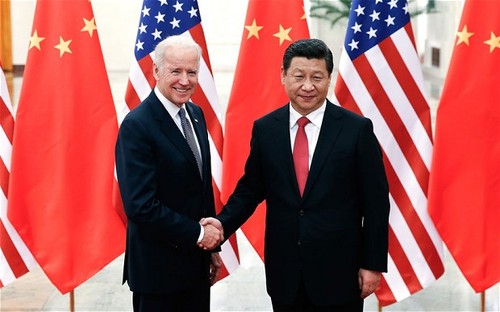(VOVworld)- US Vice President Joe Biden has arrived in Beijing, the second leg of his tour of Japan, China and the Republic of Korea. Taking place amidst escalating tensions in the region due to Beijing’s unilateral announcement to establish the Air Defense Identification Zone in the East China Sea, Mr. Joe Biden’s visit is expected to help ease the tension.

U.S. Vice President Joe Biden and Chinese President Xi Jinping inside the Great Hall of the People in Beijing Photo: REUTERS/Lintao Zhang
|
Different from being a trade mission as it was supposed to be, Joe Biden’s visit now focuses on escalating security tension in East Asia. Japan, China and the Republic of Korea have become the center of controversy over two disputed islands, over which both Tokyo and Beijing claim sovereignty. Battles of words have become worse threatening the ignition of a military confrontation. The schedule of Biden’s tour reflects Washington’s attempts to not only improve ties with China but also strengthen its alliance with Tokyo and Seoul.
Words and actions
Though it has never officially opposed China in the latter’s territorial disputes with Japan, Washington has several times told Tokyo that the Senkaku island in the East China Sea is part of the two countries’ security treaty and has opposed any efforts to change Japan’s control over the island.
3 days after China announced the establishment of the ADIZ, Washington mobilized 2 B-52 bombers to this region and stressed that it didn’t accept China’s ADIZ, would not meet China’s demands to open radio contact and reveal flight schedules and would not change US military activities in the region. 3 days after this, Washington surprisingly urged US civilian planes to abide by China’s regulations in the region. Despite explaining that this statement did not mean the US accepted China’s ADIZ-related demands, Washington’s unclear attitude angered Japan. As a result, upon stepping foot in Japan, Biden immediately calmed the US ally by saying that the two countries’ military alliance that was set up in 1950 is still valid and the US will stay side by side with Japan.
However, words are different from actions. Joe Biden has fallen into a difficult situation in this trip. Before arriving in Beijing, Mr. Biden has been welcomed with a reserved attitude by Chinese media. China strongly criticized Washington’s concerns about Beijing’s ADIZ plan that Biden expressed in a meeting with Japanese Prime Minister Shinzo Abe. The China’s Daily on Wednesday warned that Biden’s support for Japan would undermine the prestige that he had in China and that if the US wanted to reduce tension in the region, it would have to stop supporting Tokyo’s dangerous policy of “being on the verge of war”. It is unknown whether Beijing’s tough stance or the importance of maintaining a stable relationship with China has diverted Biden’s tour. The ADIZ-related issue was vaguely touched upon in the talks between Biden and Xi Jinping. These two leaders discussed ways to advance the new type of power relations in the 21st century, which was proposed by Chinese President Xi Jinping during his visit to the US earlier this year. The two leaders agreed that dialogue and cooperation is the best for both countries.
Difficult mission
Despite fears about China’s uprising, the US would not turn its back against China. US President Barak Obama’s absence at two summits of the Asia Pacific region last October showed that the US has become more cautious in its relationship with powers in East Asia. Current developments in the region are posing a lot of challenges for Mr. Biden to accomplish his mission.